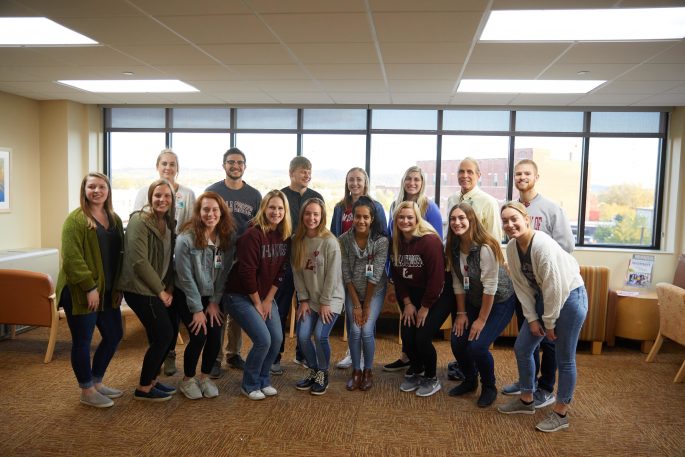Posted p.m. Sunday, Nov. 10, 2019

More than 100 UWL students volunteer with Gundersen child programming, contributing to building a trauma-informed community.
More than 100 UWL students volunteer with Gundersen child programming, contributing to building a trauma-informed community
A collaborative effort between Gundersen Health System and UW-La Crosse student volunteers is helping parents in the Coulee Region raise healthy and resilient children.
More than 100 UWL students since fall 2013 have played a key role in helping to keep Gundersen’s parent programming running strong by providing the child programming that runs alongside the parent programs, explains Jeff Reiland, a child and family therapist at Gundersen. He is also an adjunct instructor in UWL’s Physician Assistant Program and the Psychology Department.
“This is a remarkable collaborative effort between one of our medical facilities and UWL,” says Reiland. “Students in these programs dedicate over 2,000 volunteer hours each year.”
Those two, eight-week Gundersen parent programs include: Parents Raising Resilient Children and Triple P. They aim to provide participants with parenting skills grounded in child development theory and improve the quality of interaction between parent and child.
Given the recent understanding of early life trauma and adversity on developing children, parenting programs have become more important than ever, says Reiland. Yet, the high cost of childcare can be a barrier for parents being able to make an eight-week commitment to a program. The child programming eliminates that barrier.
“The [child] programs also go a step further by helping children learn social and emotional skills during their time with the students while their parents are also learning,” he explains. “Some parents have even shared that they were inspired from watching our student interns interact with their children.”
While students’ volunteer contributions are a win for Gundersen, students can build on what they are learning in the classroom about adverse childhood experiences research by becoming a part of prevention and early intervention strategies to reduce risks from ACEs, says Reiland.
“We are in essence, helping parents increase protective factors for their children,” he notes.
In any given semester about 20 UWL students are not only providing the child programming, but also developing it. The programming is centered on themes such as emotion recognition and regulation, kindness, friendship and problem solving. Each program has a weekly themed curriculum that introduces skills through non-competitive, non-violent and cooperative play, activity, games, crafts and story.

“Our Children's Program Companion manual has been shared around the world in other ACT-RSK programs that are looking for ways to enhance their own children's program,” says Reiland.
Most parents share that the children's program was a real help in deciding to attend the parent programming, adds Reiland.
“The more parents participate and learn, the more they realize how common it is to be frustrated as parent. The most gratifying feedback that I hear from parents when they graduate is that they learned so much by listening to other parents and they no longer felt alone,” says Reiland “They saw their relationships with their children improve over the short eight-week program just by changing their own approach to parenting!”
About the programs:
Parents Raising Resilient Children (which closely follows the ACT-Raising Safe Kids curriculum developed by the American Psychological Association) is available at no cost four times each year to the greater La Crosse Community. Triple P is offered twice each year to parents with children struggling with more challenging behaviors that may need more intensive intervention. A physician referral is needed for Triple P.
Both programs coincide with the university calendar.
Parents can register for Parents Raising Resilient Children (free) online at: https://www.gundersenhealth.org/services/behavioral-health/education-resources/parents-raising-resilient-children/
For Triple P, parents can contact Jeff Reiland through parenting@gundersenhealth.org.
For more information email parenting@gundersenhealth.org or calling the Parent Education Line at 608.775.2826.
Want to volunteer? UWL student volunteers are recruited for both programs in the late fall and early spring annually. It's a two-semester commitment for students. Students can contact Jeff Reiland, a child and family therapist at Gundersen and adjunct instructor in UWL’s Physician Assistant Program and the Psychology Department, directly to inquire at jreiland@uwlax.edu
